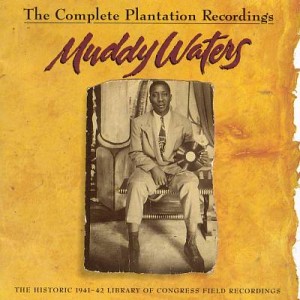
“Name McKinley Morganfield, nickname Muddy Water, Stovall’s famous guitar picker,” Muddy clearly said in his first ever recording session, August 1941. McKinley “Muddy Water” Morganfield, of course, the father of modern Chicago Blues, and the only household Blues name – along with B.B. King. Note that “Water” is singular, and the beauty here is that one can hear him say it for himself.[i]
 In time, the two sessions were released as Down On Stovall’s Plantation, issued on the Testament record label. These recordings were later re-issued on CD; first as Muddy Waters: The Complete Plantation Recordings. The historic 1941-42 Library of Congress field recordings by Chess Records in 1993, and later still after being re-mastered in 1997.[ii]
In time, the two sessions were released as Down On Stovall’s Plantation, issued on the Testament record label. These recordings were later re-issued on CD; first as Muddy Waters: The Complete Plantation Recordings. The historic 1941-42 Library of Congress field recordings by Chess Records in 1993, and later still after being re-mastered in 1997.[ii]
Waters was around 26 or 27 during the time of these seminal sessions. The collection contains early acoustic versions of songs Waters later recorded electrically for Chess Records such as “Walking Blues”, “I Can’t Be Satisfied” and “Feel Like Goin’ Home”. Lomax was searching for the great Robert Johnson — who had already died — when he discovered Muddy Waters.
 Waters plays guitar and sings on all of the 22 songs. The other musicians on these Library of Congress sessions include guitarist Charles Berry, guitarist Son Simms, vocalist Percy Thomas and vocalist Louis Ford. On certain numbers, a jug band vibe emerges. Vintage photographs of Muddy’s cabin in Clarksdale, Mississippi, exist in the liner notes. This rare disc features interviews with Waters where he answers questions concerning musical influences, tunings, song meanings and inspiration for specific tunes.[iii]
Waters plays guitar and sings on all of the 22 songs. The other musicians on these Library of Congress sessions include guitarist Charles Berry, guitarist Son Simms, vocalist Percy Thomas and vocalist Louis Ford. On certain numbers, a jug band vibe emerges. Vintage photographs of Muddy’s cabin in Clarksdale, Mississippi, exist in the liner notes. This rare disc features interviews with Waters where he answers questions concerning musical influences, tunings, song meanings and inspiration for specific tunes.[iii]
“Son House? Who’s that?,” Lomax asks.
We hear Lomax’s inquiries, getting to the bottom of the origins of American blues, we listen in as Waters tells him how he learned to play bottleneck slide (with an actual bottle) from Son House. It is very rare indeed to have contemporaneous first-hand testimony from a major artist of an original American art, when he was still living in the most important region and knew the most important musicians. It doesn’t get better than this, and establishes these recordings as a major musicological treasure as well as a collection some of the best blues performances available.
 Muddy Waters – The Complete Plantation Recordings
Muddy Waters – The Complete Plantation Recordings
Chess – CHD 9344
Personnel includes: Muddy Waters (guitar, vocals); Percy Thomas (guitar); Henry “Son” Simms (violin); Louis Ford (mandolin).
Reissue producer: Andy McKaie. Recorded on Stovall’s Plantation in Clarksdale, Mississippi between 1941 and 1942. Includes liner notes by Mary Katherine Aldin. Digitally remastered by Erick Labson (MCA Music Media Studios).
So, how and when did the nickname “Muddy Water” become plural?
The surprising answer is found in a book titled, Lost Delta Found – Rediscovering the Fisk University – Library of Congress Coahoma County Study, 1941-1942 by John W. Work, Lewis Wade Jones, and Samuel C. Adams, Jr. (Robert Gordon and Bruce Nemerov editors). The editors first point out further proof of the singular “Water” in a footnote on page 51. It’s in the form of handwriting by Work on a 1943 photograph of Muddy and his mentor Son Sims, “The photo of Muddy and Son Sims is labeled in John Work’s hand, ‘Muddy Water.’” The photograph is shown with labeling on page 119.
It seems a clerical error by Alan Lomax himself added the “s” to “Water.” Again quoting from the page 51 footnote: “Lomax refers to Morganfield as ‘Muddy Waters’ (and repeatedly misspells ‘Sims’ as ‘Simms’). The first published misidentification occurs in Lomax’s liner notes that accompany the 1942 Library of Congress album Afro-American Blues and Game Songs.”
By the time Muddy was in Chicago, it seems he went with the flow and accepted his third nickname to be the euphonious appellation by which he is known to recorded history, “Muddy Waters.”[iv]
[i] James “Skyy Dobro” Walker, “Did A Clerical Error Change Muddy Waters History? – Evolution Of A Nickname”, Blues Blast Magazine, February 25, 2015. Accessed on 2/4/2016.
[ii] Barry Kerzner, “Muddy Waters’ “The Complete Plantation Recordings” is the Holy Grail”, ChicagoBlues.com, November 20, 2014. Accessed on 2/4/2016.
[iii] James Calemine, “Muddy Waters’ “The Complete Plantation Recordings”, Swampland.com. Accessed on 2/4/2016.
[iv] James “Skyy Dobro” Walker, “Did A Clerical Error Change Muddy Waters History? – Evolution Of A Nickname”, Blues Blast Magazine, February 25, 2015. Accessed on 2/4/2016.
